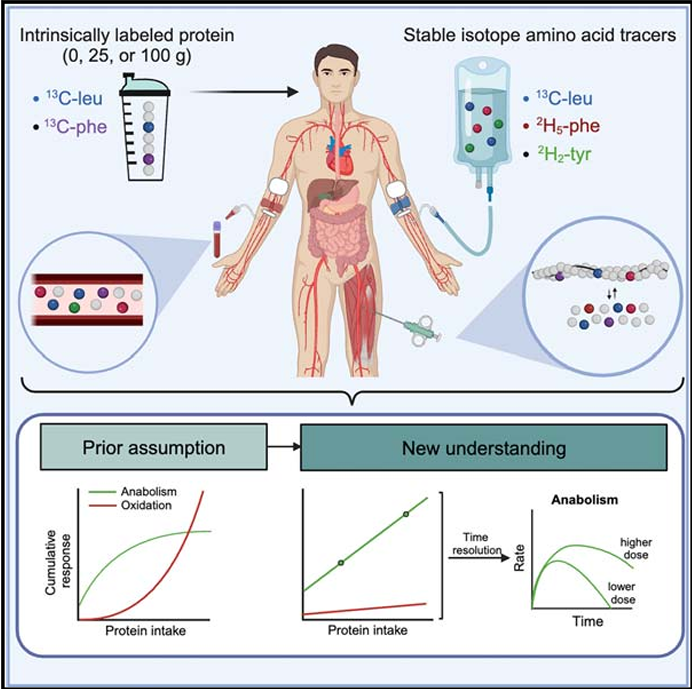
Maximizing Muscle: The Latest Research on Protein and Post-Exercise Nutrition
In the ever-evolving world of fitness and health, protein’s role has always been central, particularly in its contribution to muscle recovery and growth. Conventional wisdom has long suggested a moderate intake of protein post-exercise.
However, recent research in sports nutrition brings new insights, challenging these longstanding dietary norms and inviting us to reconsider our approach to post-exercise nutrition.

Image from Trommelen et al. (2021) PMID: 33487181
Focusing on young, healthy individuals, this study delves deep into the body’s protein synthesis post-exercise, a vital process for muscle repair and growth.
Traditionally, it was believed that after exercise, the body could only utilize a limited amount of protein for muscle protein synthesis, typically around 20-25 grams. (Muscle protein synthesis is the process through which the body rebuilds and repairs muscle fibers, making it crucial for athletes and fitness enthusiasts). In this controlled environment, participants followed a specific exercise regimen and then consumed varying amounts of protein, well above this usual recommendation. The findings reveal a significantly higher capacity for protein utilization post-exercise, potentially up to 100 grams.
This suggests a more robust and adaptable protein metabolism than previously understood, indicating that the body may benefit from higher protein intake for optimal muscle recovery and growth post-exercise.

Graphical abstract created by Trommelen et al., (2023)
The implications of these findings are vast for the fitness community. They suggest that fitness enthusiasts and athletes could benefit from revisiting their post-workout protein strategies. This study could reshape dietary “guidelines” within the fitness industry, emphasizing the need for more tailored and individualized nutritional approaches. It highlights the importance of considering personal health profiles and specific training needs when devising dietary plans.
In response to these findings, those in the fitness world, including users of fitness apps like Trainerize, might consider experimenting with their protein intake post-workout. This could involve gradually increasing protein consumption through meals or supplements and closely observing the body’s response. It’s important, however, to maintain a balance and take a holistic approach to nutritional advice. While increasing protein intake, individuals should address other nutrients to ensure overall dietary health. This approach necessitates personalized nutrition plans, which align with individual fitness goals and health conditions, an important aspect in modern fitness training and coaching.
The study offers a fresh perspective on post-exercise nutrition and its potential role in “optimizing” muscle recovery and growth.
It encourages a more nuanced understanding of our body’s capabilities and the importance of adapting our nutritional strategies to our unique needs. As research in sports nutrition and fitness technology advances, staying informed and flexible in our dietary choices will continue to be a point of interest for those looking to optimize their fitness outcomes.
This research enriches our knowledge, provides more uncertainty, and empowers fitness enthusiasts and trainers to make more informed choices about their post-exercise nutrition, ensuring that each workout is maximized for the best possible results in muscle recovery and overall health.



